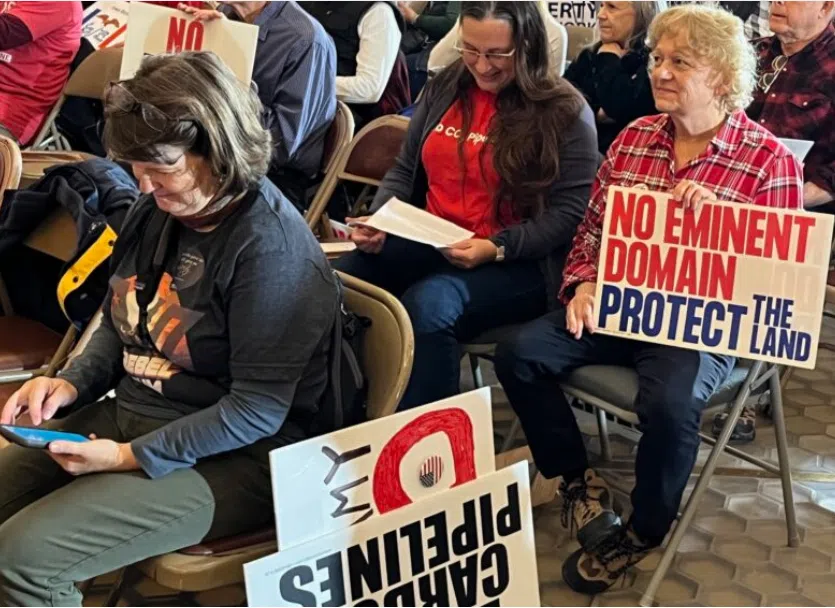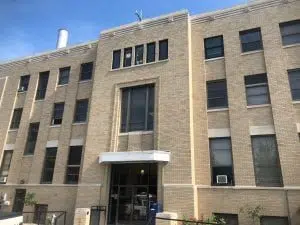Iowa Dispatch Jared Strong
(Des Moines) A bill approved by the Iowa House on Thursday would allow landowners who are subject to eminent domain requests by carbon dioxide pipeline companies to challenge the legitimacy of those requests in court earlier in the permit proceedings.
House File 2664 was approved by a bipartisan, 86-7 vote. Its future in the Senate is unclear.
It is the latest attempt by the House to aid landowners who object to Summit Carbon Solutions’ proposed use of eminent domain to build a sprawling pipeline system that would transport captured carbon dioxide from 30 ethanol plants in Iowa to North Dakota for underground storage.
If the Iowa Utilities Board grants the company’s request, landowners who have refused to negotiate easements for the project voluntarily would have to give up the land use at a price set by a government board.
A bill the House adopted last year would have required Summit to obtain voluntary land easements for 90% of its route before being eligible for eminent domain. The Senate did not take it up.
The new bill the House approved Thursday would not, itself, limit eminent domain for the pipeline projects. It is meant to expedite a court decision about whether eminent domain is allowable — a decision that under current rules might come many months after state regulators issue a permit.
The bill would allow court challenges before permits are issued, at the request of affected landowners or the companies that propose the projects.
“For that entire period, you have the century farms, landowners, people who didn’t especially want to have this pipeline going over their land and have some questions about it, not being able to get an answer on their constitutional law question and not being able to sell their land at full value or make a decision on tiling or make a decision on estate planning for all that period of time,” said Rep. Charley Thomson, R-Charles City, who is an attorney and managed the bill. “This bill corrects that.”
Summit began its pipeline permit process with the Iowa Utilities Board in August 2021. A year later in August 2022, it began notifying the board of properties that might be subject to its eminent domain requests. Now, about 19 months later, the board is poised to decide those requests, which represent about a quarter of its initial route in Iowa.
The board has declined say whether Summit’s project benefits the public in a way that makes it eligible for eminent domain.
“This legislation simply allows both landowners and companies the opportunity to have a declaratory judgment up front on the constitutionality of an eminent domain request, before precious time and money are wasted,” said Rep. Steven Holt, R-Denison, who has been a leading voice against eminent domain for carbon dioxide pipelines. “This legislation would allow landowners a little peace of mind, getting to know up front the validity of an eminent domain request so that they could plan accordingly, as opposed to waiting and fighting for years, their land in limbo, their futures in doubt, their lives full of tension and fear, while they plead with their elected officials to hear them.”
The legislation is opposed by Summit, the Iowa Renewable Fuels Association and several biofuels companies, according to lobbyist declarations. The Iowa Farm Bureau Federation did not declare its opposition or support.
Seven House Republicans voted against the bill: Michael Bergan of Decorah, Tom Determann of Clinton, Chad Ingels of Randalia, Brian Lohse of Bondurant, Norlin Mommsen of DeWitt, Matt Rinker of Burlington, and David Sieck of Glenwood.
The scope of Summit’s project has expanded in recent months after another company, Navigator CO2, abandoned a similar proposal. That has led Summit to ink agreements with most of the ethanol plants that had intended to connect to the Navigator system.
Summit’s proposal has grown to about 2,500 miles of pipe in five states to transport carbon dioxide from 57 ethanol plants. The company was initially denied permits by state regulators in the Dakotas, but North Dakota is reconsidering a modified plan. Summit has said it will reapply in South Dakota with a different route.










